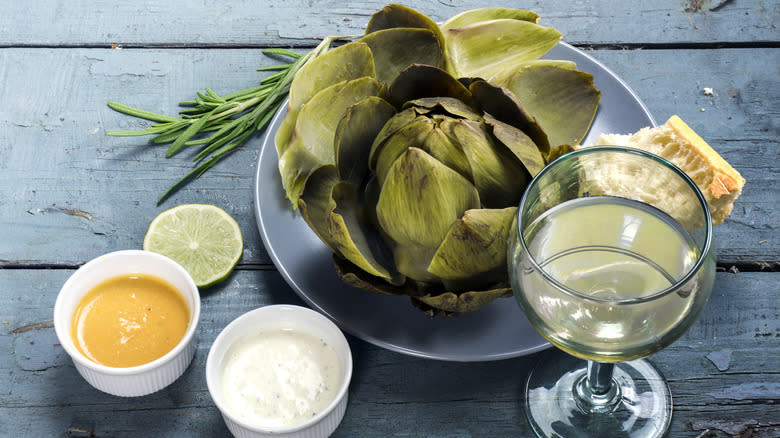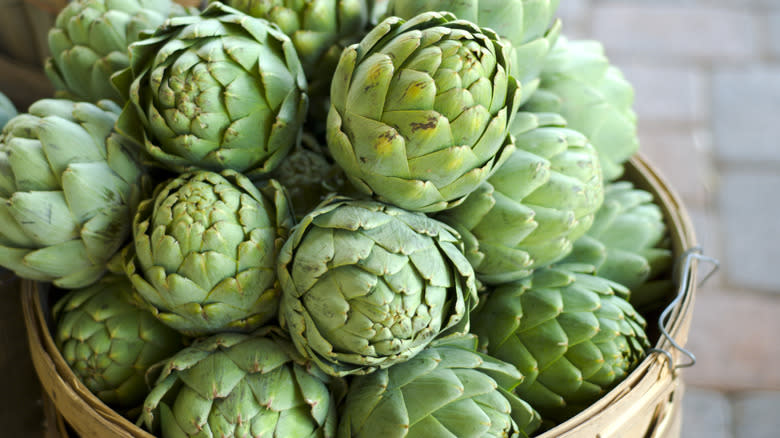A Sommelier Explains Why It's So Difficult To Pair Artichokes With Wine

When pairing food and wine, it's essential to create combinations where the textures and flavors of the food can highlight the textures and flavors of the wine and vice versa. Scott Mattson, certified sommelier and co-owner of Nocturne Jazz & Supper Club in Denver, has considerable experience achieving this delicate balance. Although Mattson regularly provides an optimal pairing for his guests at Nocturne, he did share with Daily Meal that one vegetable can be challenging to pair with certain wines: artichokes.
Mattson advises that if you try to pair artichokes with a wine that has a lot of residual sugar, it will taste like you've poured Sweet 'n Low into your glass, which can be very distasteful. Because of the chemical compounds they contain, artichokes can leave an overly sweet taste in your mouth when paired with certain wines. Mattson explained, "Any wine with a hint of softness or sweetness will taste a little odd with artichoke, and that breaks the rule of trying to highlight the attributes of each through pairing."
Read more: 10 Of The Healthiest Beers You Can Drink
Artichokes Have Acids That Leave A Lingering Sweet Taste In Your Mouth

If you've ever made a meal where artichokes accompany other foods (such as chicken and artichokes), you've likely found that when you've eaten your meal, the other food (and even water) tastes sweeter than it should. This is due to the vegetables' acid. Scott Mattson explained, "Artichokes contain cynarine and chlorogenic acid which make things taste sweeter than normal for a number of minutes after consuming." This lingering sweetness makes artichokes uniquely tricky to pair with wine.
The lingering sweet taste that artichokes can leave in your mouth may be explained by the cynarine's effect on the sweet receptors in our taste buds. When you eat an artichoke, its cynarine may inhibit your sweet receptors. Then, when you drink liquid or eat another food, the cynarine gets washed away, your sweet receptors are no longer hindered, and anything you eat or drink might taste uncharacteristically sweet because of messages transmitted from the fibers of the sweet receptors to your brain. Essentially, removing the cynarine from food or liquid may trigger a sweet taste. This is why pairing artichokes with sweet or subtly sweet wine can make your drink unpleasant.
There Are Wines That You Can Pair With Artichokes

Although artichokes may be challenging to pair with wine, you can still enjoy the two together. You just have to choose the right wine to have alongside your vegetables. If you'd like to glean from Scott Mattson what may be the absolute best wine to pair artichokes with, you're in luck. The sommelier told Daily Meal, "If I had to pick one varietal, grüner veltliner with [its] lean frame, fresh minerality and slightly green nature is the ultimate artichoke wine."
Grüner veltliner is the namesake of its grape variety, and the wine is well-known among wine connoisseurs for being exquisitely made in Austria. However, the grape variety and wine are also produced in other places worldwide, including Hungary, Slovakia, California, and Oregon. In addition to being deliciously acidic, grüner veltliner has a citrusy flavor profile made of lemon-lime notes, and it pairs very well with vegetables. This wine is popular among those who enjoy sauvignon blanc and pinot grigio. You'll likely get a great bottle of grüner veltliner without spending much money.
Mattson also shared other kinds of wines that pair well artichokes. "Dry and high in acid wines [are] the best wines to pair with it."
Some highly acidic wines you can enjoy with artichokes include sauvignon blanc, pinot grigio, and albariño. Dry wines you can pair with artichokes for a complementary balance of flavor include Spanish txakoli and fino sherry.
Read the original article on Daily Meal.

